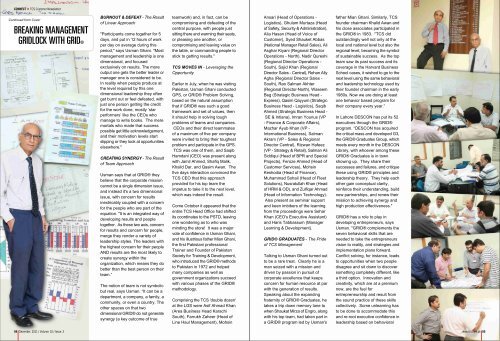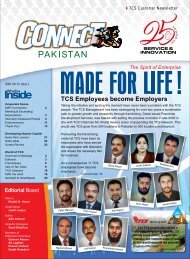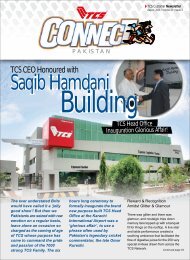PDF Version - TCS Courier
PDF Version - TCS Courier
PDF Version - TCS Courier
Create successful ePaper yourself
Turn your PDF publications into a flip-book with our unique Google optimized e-Paper software.
<strong>TCS</strong> Customer Newsletter<br />
Continued from Cover<br />
BURNOUT & DEFEAT - The Result<br />
of Linear Approach<br />
"Participants come together for 5<br />
days, and put in 12 hours of work<br />
per day on average during this<br />
period," says Usman Ghani. "Most<br />
management and leadership is one<br />
dimensional, and focused<br />
exclusively on results. The more<br />
output one gets the better leader or<br />
manager one is considered to be.<br />
In reality when people produce at<br />
the level required by this one<br />
dimensional leadership they often<br />
get burnt out or feel defeated, with<br />
just one person getting the credit<br />
for the work done, mostly ‘star<br />
performers’ like the CEOs who<br />
manage to write books. The mere<br />
mortals who made that success<br />
possible get little acknowledgement,<br />
and their motivation levels start<br />
slipping or they look at opportunities<br />
elsewhere."<br />
CREATING SYNERGY - The Result<br />
of Team Approach<br />
Usman says that at GRID® they<br />
believe that the corporate mission<br />
cannot be a single dimension issue,<br />
and instead it's a two dimensional<br />
issue, with concern for results<br />
inextricably coupled with a concern<br />
for the people who are part of the<br />
equation. "It is an integrated way of<br />
developing results and people<br />
together. As these two axis, concern<br />
for results and concern for people,<br />
merge they render a variety of<br />
leadership styles. The leaders with<br />
the highest concern for their people<br />
AND results are the most likely to<br />
create synergy within the<br />
organization, which means they do<br />
better than the best person on their<br />
team.”<br />
The notion of team is not symbolic<br />
but real, says Usman. “It can be a<br />
department, a company, a family, a<br />
community, or even a country. The<br />
other spaces on that two<br />
dimensional GRID® do not generate<br />
synergy (a key outcome of true<br />
teamwork) and, in fact, can be<br />
compromising and defeating of the<br />
central purpose, with people just<br />
sitting there and warming their seats,<br />
or pleasing one another, or<br />
compromising and leaving value on<br />
the table, or commanding people to<br />
stick to getting results."<br />
<strong>TCS</strong> MOVES IN - Leveraging the<br />
Opportunity<br />
Earlier in July, when he was visiting<br />
Pakistan, Usman Ghani conducted<br />
GPS, or GRID® Problem Solving,<br />
based on the natural assumption<br />
that if GRID® was such a good<br />
framework and set of values, then<br />
it should help in solving tough<br />
problems of teams and companies.<br />
CEOs and their direct teammates<br />
of a maximum of five per company<br />
were invited to bring their toughest<br />
problem and participate in the GPS.<br />
<strong>TCS</strong> was one of them, and Saqib<br />
Hamdani (CEO) was present along<br />
with Jamil Ahmed, Shafiq Malik,<br />
Khalid Dar, and Qasim Awan. The<br />
five days interaction convinced the<br />
<strong>TCS</strong> CEO that this approach<br />
provided for his top team the<br />
impetus to take it to the next level,<br />
which was indeed the result.<br />
Come October it appeared that the<br />
entire <strong>TCS</strong> Head Office had shifted<br />
its coordinates to the PSTD, leaving<br />
one wondering as to who was<br />
minding the store! It was a major<br />
vote of confidence in Usman Ghani,<br />
and his illustrious father Mian Ghani,<br />
the first Pakistani professional<br />
Trainer and Founder of Pakistan<br />
Society for Training & Development,<br />
who introduced the GRID® methods<br />
to Pakistan in 1972 and helped<br />
many companies as well as<br />
government organizations succeed<br />
with various phases of the GRID®<br />
methodology.<br />
Comprising the <strong>TCS</strong> 'double dozen'<br />
at the LGS were Asif Ahmad Khan<br />
(Area Business Head Karachi<br />
South), Farrukh Zaheer (Head of<br />
Line Haul Management), Mohsin<br />
Ansari (Head of Operations -<br />
Logistics), Ghulam Murtaza (Head<br />
of Safety, Security & Administration),<br />
Alia Hasan (Head of Voice of<br />
Customer), Syed Shauket Abbas<br />
(National Manager Retail Sales), Ali<br />
Asghar Kiyani (Regional Director<br />
Operations - North), Nadir Qureshi<br />
(Regional Director Operations -<br />
South), Sajid Khan (Regional<br />
Director Sales - Central), Rehan Ally<br />
Agha (Regional Director Sales -<br />
South), Rao Salman Akhter<br />
(Regional Director-North), Waseem<br />
Beg (Strategic Business Head -<br />
Express), Qasim Qayyum (Strategic<br />
Business Head - Logistics), Saqib<br />
Ahmed (Strategic Business Head -<br />
SE & Intiana), Imran Younus (VP<br />
- Finance & Corporate Affairs),<br />
Mazhar Ayub Khan (VP -<br />
International Business), Salman<br />
Akram (VP - Sales & Regional<br />
Director Central), Rizwan Hafeez<br />
(VP - Strategy & Retail), Salman Ali<br />
Siddiqui (Head of BPR and Special<br />
Projects), Feroze Ahmed (Head of<br />
Customer Services), Mohsin<br />
Keshodia (Head of Finance),<br />
Muhammad Sohail (Head of Fleet<br />
Solutions), Nusratullah Khan (Head<br />
of HRM & OD), and Zulfiqar Ahmad<br />
(Head of Information Technology).<br />
Also present as seminar support<br />
and keen imbibers of the learning<br />
from the proceedings were Sehar<br />
Khan (CEO's Executive Assistant)<br />
and Haris Tabbassum (Manager<br />
Learning & Development).<br />
GRID® GRADUATES - The Pride<br />
of <strong>TCS</strong> Management<br />
Talking to Usman Ghani turned out<br />
to be a rare treat. Clearly he is a<br />
man seized with a mission and<br />
driven by passion in pursuit of<br />
corporate excellence that keeps<br />
concern for human resource at par<br />
with the generation of results.<br />
Speaking about the expanding<br />
fraternity of GRID® Graduates, he<br />
takes a trip down memory lane to<br />
when Shaukat Mirza of Engro, along<br />
with his top team, had taken part in<br />
a GRID® program led by Usman's<br />
father Mian Ghani. Similarly, <strong>TCS</strong><br />
founder chairman Khalid Awan and<br />
his close associates participated in<br />
the GRID® in 1983. "<strong>TCS</strong> did<br />
outstandingly well not only at the<br />
local and national level but also the<br />
regional level, becoming the symbol<br />
of sustainable success. As the top<br />
team saw its past success and its<br />
coverage in the Harvard Business<br />
School cases, it wished to go to the<br />
next level using the same behavioral<br />
and leadership technology used by<br />
their founder chairman in the early<br />
1980s. Now we are doing at least<br />
one behavior based program for<br />
their company every year.”<br />
In Lahore DESCON has put its 52<br />
executives through the GRID®<br />
program. “DESCON has acquired<br />
the critical mass and developed G3,<br />
the GRID® Graduates Group, which<br />
meets every month in the DESCON<br />
Library, with whoever among these<br />
GRID® Graduates is in town<br />
showing up. They share their<br />
successes and failures, and critique<br />
these using GRID® principles and<br />
leadership theory. They help each<br />
other gain conceptual clarity,<br />
reinforce their understanding, build<br />
new partnerships, and renew their<br />
mission to achieving synergy and<br />
high production effectiveness."<br />
GRID® has a role to play in<br />
developing entrepreneurs, says<br />
Usman. "GRID® complements the<br />
seven behavioral skills that are<br />
needed to take the entrepreneurs<br />
vision to reality, and strategies and<br />
implementation plans forward.<br />
Conflict solving, for instance, leads<br />
to opportunities when two people<br />
disagree and sit down to discover<br />
something completely different, like<br />
a third option. Innovation and<br />
creativity, which are at a premium<br />
now, are the fuel for<br />
entrepreneurship and result from<br />
the sound practice of these skills<br />
collectively. Some unlearning has<br />
to be done to accommodate this<br />
and re-root executive confidence in<br />
leadership based on behavioral<br />
04 December, 2011 / Volume: 10 / Issue: 3<br />
www.tcs.com.pk 05









